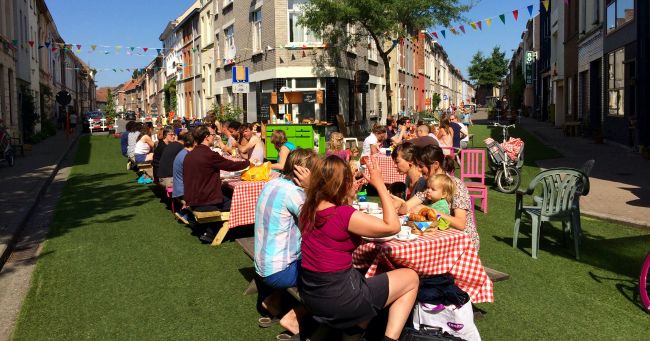Courses master Society, Sustainability and Planning
The emergence of self-organizing citizen collectives is a critical change in today's society. Taking this realization as a starting-point, the Master Socio-Spatial Planning helps you to understand the 'human factor' in spatial planning: why different groups of people embrace, contest or reject spatial changes, how they take the lead in shaping their own environment, how spatial interventions influence different stakeholders and how to engage society effectively in spatial transformations.
> Master Society, Sustainability and Planning
What will you learn?
The programme of the master Society, Sustainability and Planning consists of the following courses. Click on the course title to go to the full course description, information about lecturers, literature and time period. The courses in this programme have been scored against the United Nations Sustainable Development Goals. Find a general overview of how all of our programmes relate to the SDGs.
City Matters (5EC)
Students will be asked to reflect on current societal issues which imply spatial planning interventions and are related to contemporary issues such as social innovation, active citizenship, innovative actor-constellations and self-organization in urban development and planning. This course enables students to build their own framework to develop and conduct theory-informed empirical research in new socio-geographical contexts and to propose ‘just’ planning interventions.
Related SDG: 1 no poverty, 3 good health and well-being, 10 reduced inequalities, 11 sustainable cities and communities, 16 peace, justice and strong institutions
Interaction, Society and Space (5EC)
The course aims to introduce students to key theories on the complex interaction between people, space and decision-makers. This course shows that spatial change in neighbourhoods must be understood as deeply social processes, with social causes and effects. The neighbourhood is the foundation for a community with social ties – a home stead for groups of people. That makes issues in neighbourhoods charged with intersubjective and emotional meaning, and a demographical origin.
Related SDG: 2 zero hunger, 3 good health and well-being, 10 reduced inequalities, 11 sustainable cities and communities, 12 responsible consumption and production
Planning Theory (5EC)
The aim of the planning theory course is to gain more in-depth knowledge of the theoretical background of planning in such a way that you can identify suitable existing planning and decision-making models for issues at hand.
Engaging Society for Spatial Transformation (5EC)
We see the emergence of citizens and entrepreneurs who collectively take the lead in spatial transformation in the c0ntext of place-based development. Examples are initiatives in revitalizing of public space, self-governance in energy production, food, health-care, or landscape maintenance, or fostering social cohesion in neighborhoods and other meaningful everyday places. The course provides insight to understand these forms of self-governance from different perspectives.
Related SDG: 11 sustainable cities and communities, 13 climate action
Revitalizing Neighbourhoods (5EC)
The city is constantly in transition. This is to say that demands, tensions and opportunities are continuously changing, which lead to new societal challenges for policy makers. In the Revitalising Neighbourhoods course, you
explore the ‘state of the art’ of these societal challenges in neighbourhoods and reflect on urban renewal policies.
Related SDG: 3 good health and well-being, 10 reduced inequalities, 11 sustainable cities and communities
Living Lab Sustainable Places (5EC)
Students analyse spatial challenges and ambitions of a real-life case in order to formulate provocative yet viable and credible policy advice. Socio-spatial data, policy documents, interaction with the actual stakeholders, and location feed into your analysis. Students resulting policy advice presents the client with an appealing and authentic vision of its future and needs to show how to transform the location under investigation into a more sustainable place (people, planet, profit).
Electives (10EC)
You can find an overview of the electives for Socioty, Sustainability and Planning in the course catalogue Ocasys.
Master thesis (20EC)
The Master thesis involves an individual research project on issues relevant to socio-spatial planning. The aim of the project is to gain practical and comprehensive experience in doing scientific research.
| Laatst gewijzigd: | 21 september 2023 15:05 |




